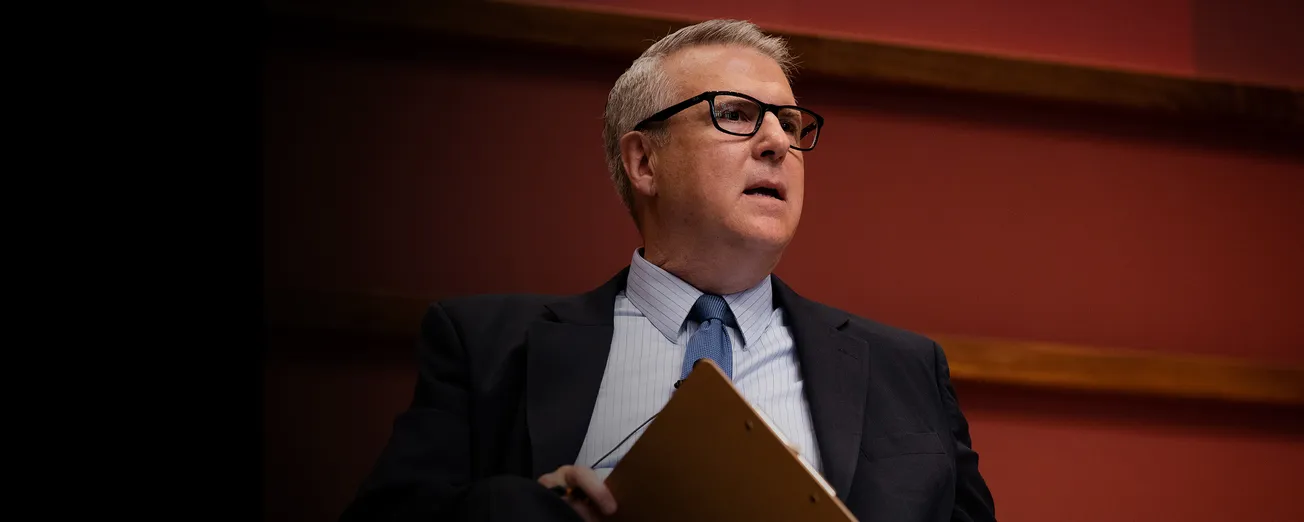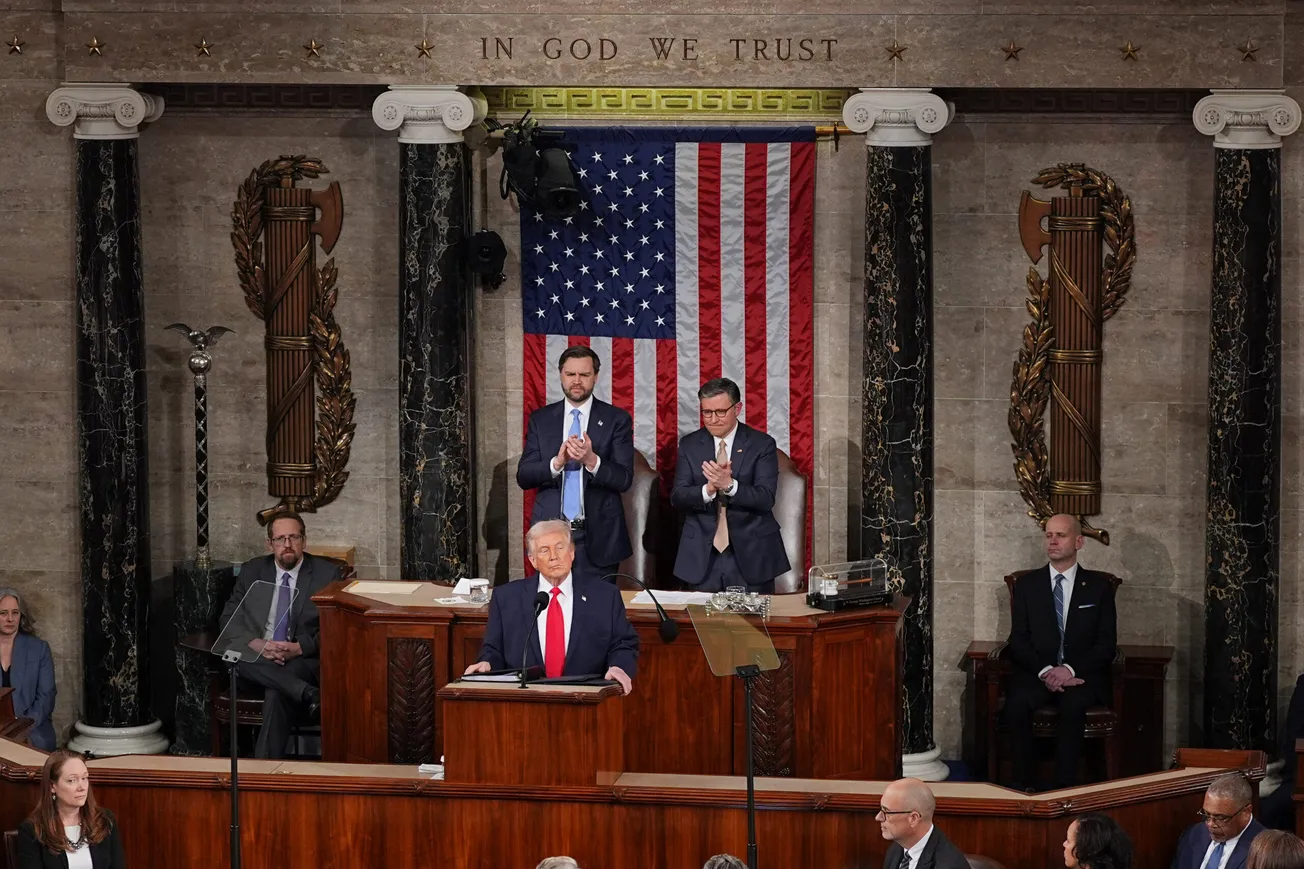Table of Contents

Few consider Stanford University an activist school, especially when compared to our rival across the Bay, the University of California at Berkeley. Students and staff have attempted to change this perception in recent months through advocacy on issues like the living wage or sweatshop-free labor. Despite successful efforts by the Stanford Labor Action Coalition (SLAC) to persuade President John Hennessy to change the living wage policy last June, even their cause generally met limited interest by the university community. Perhaps emboldened by recent activist victories, several student and faculty groups have united to question former Secretary of Defense Donald Rumsfeld’s appointment to the Hoover Institution, although many inside the university continue to misunderstand their arguments or find them unimportant.
One week after Hoover Director John Raisian issued a press release announcing Rumsfeld’s appointment as a Distinguished Visiting Fellow to the Hoover Institution on September 7, Associate Professor Pamela M. Lee, a member of the Department of Art and Art History since 2000, posted an online petition against the Rumsfeld appointment.
“The petition is a collaborative effort,” Lee emphasized. While Lee sent an initial e-mail to the list of Faculty Against the War, currently an 89-member group started in 2002 by faculty concerned about the invasion of Iraq, the group worked together to draft both the language in the petition as well as a letter to the San Francisco Chronicle.
Lee further asserted, “The petition is elastic enough to accommodate a wide range of views about the Rumsfeld appointment… my take is by no means exhaustive nor necessarily shared by every one involved in the larger campaign.” Indeed, the “No to Rumsfeld Stanford Community Petition” remains the most visible component of opposition to Rumsfeld’s appointment to Hoover as it currently stands, with over 3900 signatories from Stanford undergraduates, graduate students, faculty, and alumni.
Student Rally Overshadowed
“What do Rumsfeld and sweatshops have in common?” asks an e-mail circulated on various lists by the sweat-free campaign. “They’re both things Stanford should have nothing to do with! And they’re both being protested tomorrow!” In a collaborative effort between two student activist groups, both opposition to sweatshop labor and Rumsfeld’s appointment to the Hoover institution were jointly protested in a demonstration in White Plaza on November 8, exactly one year after Donald Rumsfeld’s resignation as Secretary of Defense.
Stanford Says No, a spin-off of Stanford Against the War, helped to organize the event. The group was founded in response to apathy against the war on campus, as well as to create more activism. Although they passed out flyers at the event, they have been unable to advertise their name because they have yet to register with the Office of Student Activities. Further, many of the people distributing their flyers did not even associate with the group: included among them were representatives of Revolution newspaper out of Oakland, self-styled as the “voice of the Revolutionary Communist Party.”
Student organizers also invited the Raging Grannies, a group founded in Canada that uses songs and satire to make political points, to participate in the protest, singing songs like “Rummy Go Home!” and “Peace Instead of War” to the tunes of “My Bonnie Lies Over the Ocean” and “When the Saints Come Marching In” respectively. Both students and faculty spoke during the rally, including a dramatic reading by the Stanford Theater Activist Mobilization Project (STAMP), and a performance by Stanford’s own Filipino dance group Kayumanggi. Three students dressed in prison uniforms and wore bags over their heads to conjure images of torture and human rights abuses.
Several faculty have indicated a willingness to participate in hearings, where evidence of Rumsfeld’s actions as Defense Secretary can be aired and debated,” announced Professor Todd Davies, Associate Director of the Symbolic Systems Program, to dozens of students and visitors in White Plaza. He went on to compare appointing Rumsfeld to appointing Richard Nixon, Spiro Agnew, former FEMA director Michael Brown, or even former U.S. Rep. Mark Foley, who resigned after attempting sexual activity with underage House of Representatives pages, to “distinguished visiting fellow” positions at the Hoover Institution. Hilton Oberzinger, Associate Director of Honors and Advanced Writing at the Hume Writing Center, also spoke.
Unfortunately for the organizers of the demonstration, who attempted to combine the efforts of both Stanford Says No and Sweat-Free Stanford to amplify their messages and attempt to instill greater activism on campus, the majority of students in White Plaza on November 8 came for the ASSU Free Bike Light Initiative. According to Student Life, Housing, and Education Chair Jonathan Kass, over 170 bike lights were distributed that day.
Other estimates suggest that there were never more than 100 students and visitors at the protest rally at any one time. Another student working at the bike light initiative commented on condition of anonymity, “Very few people seemed to be at White Plaza for the rally. Most people in White Plaza who were for the rally, and they were hard to pick out, seemed to be community members anyway, not even students.”
Faculty Senate Invites Raisian
The tone at the November 8 meeting of the Faculty Senate was notably different from the rhetoric used at White Plaza earlier in the day. As Faculty Senate Chair Eamonn Callan, Professor of Education, would later say, “I think the discussion of the Rumsfeld appointment has been remarkable for its thoughtfulness and lack of rancor.”
At the Faculty Senate meeting on October 11, Professor Debra Satz, a member of the Philosophy Department and Director of the Ethics in Society Program, circulated a petition that would “ask John Raisian to answer questions about the criteria used for Hoover appointments in general and about the specific criteria used in the appointment of Donald Rumsfeld to distinguished visiting fellowship.”
Satz pointed out, “The main difference between that petition and Dr. Lee’s is that my petition and the discussion in the Senate focused on the criteria for appointments; it was not narrowly political.” Satz’s motion to invite Raisian passed the Senate by a 25-12 vote. Raisian addressed the Senate on November 8.
After outlining the relationship between the Hoover Institution and the Provost in hiring senior fellows and its similarity in procedure to the hiring of department faculty, Raisian listed the many overlaps of Hoover fellows who share multiple affiliations and honors with university departments and institutions.
He also began to discuss how visiting fellows specifically are hired. He said that a visiting fellow is a “generic title” for “relatively junior scholars.” Some visiting fellows, however, are recruited rather than having potential fellows apply themselves. When Hoover recruits a visiting fellow, they receive the additional title “distinguished,” because the Hoover Institution has already distinguished the potential fellow for “notable, distinct, discerning” work as part of the recruitment. Regardless of the use of the word “distinguished,” after outlining Rumsfeld’s career, Raisian contended, “Like it or not, he has had a distinguished career.”
Raisian disclosed that the appointment of visiting fellows is subject to an internal review. After discussing the potential appointment with senior fellows on a consultative basis and hearing no objection, he revealed his proposal to his executive committee and board of overseers, who responded with enthusiasm. He did, however, admit that he released his announcement of Rumsfeld’s appointment before telling President Hennessy, to whom Raisian reports directly as Hoover director. Before taking questions, he concluded, “I do not regret the appointment, but I am saddened by the reaction of some of my Stanford colleagues.”
During questions, many senators continued to challenge the use of the word “distinguished.” Several proposed uniformity or oversight over the titles given across Stanford institutions. Professor Jonathan Bendor, who represents the Graduate School of Business, argued that the most important part of Rumsfeld’s career was serving as Secretary of Defense for six years under
George W. Bush. “There is an academic integrity tied to it,” Bendor emphasized of titles.
Satz echoed the need for regulated titles across institutions. She took collaboration one step farther, however, in calling for greater integration of Stanford institutions. Specifically, she envisioned, first at the October 11 meeting and later in an interview, “an opportunity
to build on Hoover, FSI, SIEPR, and the new public policy M.A. program and try to have a
first rate policy school – something akin to Woodrow Wilson at Princeton.”
In many ways, the discussion in the Faculty Senate focused on more prospective action of further integration of or uniform regulations over various institutions, as the Senate did not discuss retracting Rumsfeld’s appointment to Hoover. “The discussion obviously touched on many topics that are properly of continuing interest to the Faculty Senate,” Callan reinforced. “These topics may well be broached again by the Senate later in the year, but whether they will or not depends on the level of interest they evoke within the Senate.” He added, “I have no plans to put them on the agenda unilaterally.”
Despite being one of the more critical members of the Faculty Senate, Satz herself reflected a less radical positioning than the attempted campus activism. “I did not expect, nor did I myself endorse, a repeal of the offer to Rumsfeld,” she said.
Even Professor Lee expressed doubt about preventing Rumsfeld from following through on his appointment. She clarified, “Please note that the language of the petition does not call that the appointment be revoked. Many, though not necessarily all, would welcome this change but we are sanguine about such prospects.”
Undergraduate Senate Debates Role
While Callan affirmed the Faculty Senate’s relevance to the Rumsfeld appointment in considering prospective action, the ASSU Undergraduate Senate faced a contingent that insisted it was not the body’s place to comment on Rumsfeld.
Rumsfeld’s appointment first arose as an issue in the Undergraduate Senate during a prepared statement by Senator Patrick Cordova at the group’s first meeting of the school year on October 2. “I would encourage elected members of the ASSU’s governing body to be in contact with your constituents and to consider proposing a resolution based not on your own political or social dogmas but those of the students here on campus,” Cordova said.
Two weeks later, Senator Stuart Baimel, believing that the Senate was skirting the Rumsfeld appointment, announced he would author two resolutions, one in support of the appointment and one in opposition, in order to force Senate action on the issue.
On October 23, the bills were introduced for previous notice to be voted on October 30. However, the bills were tabled not only on October 30, but again on November 6. During that time, both senators and other undergraduates accused the bills of being poorly written, and did not accurately reflect the sentiments of the community.
In many ways, this revealed further confusion among student activists. Junior Laura Wadden addressed the Senate on October 30, where she claimed she represented those who signed Lee’s petition, but went on to contradict Lee’s belief in the petition’s elasticity by naming specific changes to Baimel’s bill. “We want to focus more on how Stanford’s morality and values will suffer, we don’t think that’s a proper idea,” Wadden said, referring to a line in the bill that Stanford’s brand and prestige will suffer as a result of the appointment.”
Although several senators challenged her representation, it led to a call by several senators, including Baimel and Cordova, for greater outreach to both senators and members of the undergraduate community in drafting new versions of the bills. Meanwhile, opposition to the bills had already begun.
Senator Jose Benchimol, the only senator to vote against tabling the bills at both meetings, argued against postponing bills after their presentation under previous notice, which Senator Luukas Ilves reinforced in a statement on parliamentary procedure in a later meeting. Senator Jonathan Kass stated that, “You should weigh on the other hand what the purpose of the Undergraduate Senate is, and I’m not sure that the purpose of the Undergraduate Senate is commenting based on how much you like someone, or commenting on the hiring procedures of a body we do not control, and that we have little to do with.”
When the bills came to a vote on November 13, every seat available for visitors was filled for the first time in the 2007-08 school year. Nearly a dozen undergraduates wearing orange ribbons in solidarity in their opposition to the Rumsfeld appointment attended, and three of them addressed the Senate during open forum. Sophomore Adam Hudson said, “If you guys just vote yes on this resolution to oppose [Rumsfeld’s appointment], I think it well send a big message to the entire world that look, Stanford stands for something greater.”
During the Senate’s debate, different senators made different distinctions, like Senator Sarah Golabek-Goldman’s opposition to the use of “distinguished” in his title, saying, “That is putting a moral judgment on his work or his contributions.” However, statements did primarily focus on the Undergraduate Senate’s role and ability to pass meaningful legislation relating to Rumsfeld’s appointment.
Cordova insisted, “I spent a great deal of time this weekend going through Senate documents…and I was attempting to find evidence that would suggest limits of the ASSU Senate against passing resolutions of this matter. I assure you… I have found none.”
“I have heard myself from dozens of students who oppose Donald Rumsfeld… but who have explicitly asked me to… ask us to work on things that really do have a positive effect, like the bike light initiative, on improving the way in which student groups coordinate with the OSA,” Ilves maintained. “Not one of you, my fourteen colleagues, included in your platforms anything about opposing… controversial faculty appointments in general. We all had rich and detailed platforms full of… innovative ideas for changing student life on campus.”
“Who will represent the view of the undergraduate student body if we don’t?” Baimel countered. Still, it was Senator Ré Phillips who drew applause when she said, “Let’s not give up before we have spoken.”
After a motion to break, tension resumed in the Senate meeting when senators requested that the chair hold a roll call vote. When the votes were counted, 8 senators voted in favor, with 5 in opposition and 2 in abstention. Despite a majority of senators supporting, the bill did not pass because it failed to reach the necessary two-thirds vote.
Upon the vote’s announcement, most of the visitors walked out on the Senate. One, however, stayed behind to “boo” the Senate when Chair Priyanka Sharma invited closing remarks.
As he left the meeting, Baimel reiterated, “If not us, then who?” If the Undergraduate Senate does indeed represent the voice of the undergraduate student body, then the vote on the Rumsfeld initiative also represents the lack of requisite activist spirit on campus to maintain a visible opposition to Donald Rumsfeld’s appointment.




